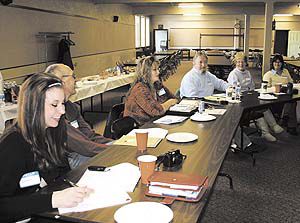Group brainstorms on future of Helper’s facility
| Amanda Holley (far left) is joined by residents who had ideas about how the Helper Library should evolve. |
Making Helper’s library a more comfortable place that provides comprehensive community information and connects citizens to cyberspace are the primary goals for the facility in the next three to five years.
Ten of Helper’s, including one elected official, rolled up their sleeves Saturday morning and got down to the business of creating the library’s future. The three-hour strategic planning meeting was facilitated by Rose Frost, a representative from the Utah State Library System.
“Your library is at a crossroads,” Frost told the small crowd. “We need to make some serious decisions about the future of the library.”
With lunch and breakfast provided all at once the focused crew munched, sipped and got down to business. Frost walked the group through a step by step process for determining the direction of the library.
She explained that before a workable plan could be crafted the understanding that libraries can’t be all things to all people should be clear in everyone’s mind. However, she was quick to assure the group that their facility could make a difference in town.
“A small library like this can be very flexible in meeting the needs of its community,” Frost said.
In addition, Saturday’s attendees were reminded that funds are tight and that changes needed to be made within the existing budget levels.
“Like many other libraries across the nation Helper is resource neutral, which means the budget stays pretty much the same,” she said.
With the parameters clearly spelled out, the real work began.
First the participants outlined the strengths of their hometown. The long list included a good demographic mix, good recreational facilities and a generous nature.
“We raised $100,000 for the miners’ families in one night,” said Denise from Spring Glen.
When it was time to identify weaknesses, resistance to change seemed to rise to the top of the list.
Frost also walked the group through identifying needs of the community. The list went a little off task as things like new businesses, including a book store and even one good tavern surfaced in the discussion.
However, the list was finally refined to encompass only those needs that a library might be able to help with including providing broader computer access, a class to teach seniors how to use e-mail and resource information on all types of community services.
After analyzing the town’s strengths, weaknesses and needs the group set about the task of picking three top items for the library to pursue in its strategic plan.
Frost presented a list of 18 possible services that vexed the group a bit as each one appeared to be something that at least one of them would have liked to see the facility pursue.
The list compiled from the types of services offered by libraries across the nation, included everything from programs to keep patrons up on local, national and world affairs to creating multimedia centers.
Some of the 18, such as genealogy research, were already being provided by the Western Mining and Railroad Museum. Sue Martell, the museum’s director suggested on more than one item that there should and could be collaboration between her facility and library.
In the end, the three that rose to the top of the heap were: Connect to the online world: Public Internet access; Know your community: Community resources and services and Visit a comfortable place: Physical and virtual spaces.
Helper resident Walt Borla was a strong advocate for making the space more comfortable, especially for seniors, his biggest issue was getting heat in one area of the library.
“If we made the area better we could have one special day a week where we invite seniors to come in and read,” he said.
Seniors were also one of the considerations in picking broader Internet access. Councilman Dean Armstrong asked Borla if the library were to offer seniors a class to learn how to navigate e-mail and the Internet would they come?
Borla nodded yes and said that was something very much needed by seniors.
With the priorities identified, the community planners job was done and their suggestions will then be passed to the newly-formed library advisory board for further planning.

